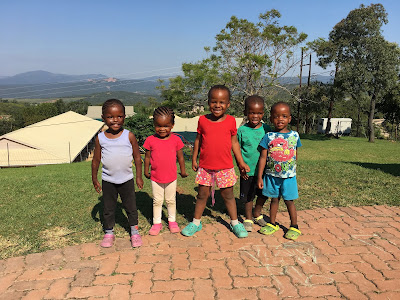We talk a lot about stigmatization in eSwatini. I am not sure if I had ever used the
word before working here, but it’s a word that is used almost daily.
There is stigmatization of people with HIV/AIDS, OVC’s
(orphans and vulnerable children), and people with disabilities.
A few days ago we had Pastors from our 30 church partners
come for the day and there were two women who asked one of our staff to see
“the burned baby”. What? Yes, they wanted us to call over our child who had been burned by her mother so that they could see her face.
They had read about her in the paper and then saw her a couple of years
ago when they were here, so wanted to see her again. As you might imagine, “mama bear” rose up and stopped the
Auntie who had been asked from going and fetching our little girl. But then I
took the opportunity to talk to them about stigmatizing a child because of the
way they look. They understood and
apologized.
Another category of stigmatization is for people with
albinism. Albinism is quite common
here (much more so than in the US or Canada) and I invited the founder of the
Albinism Foundation of Swaziland to come and educate our staff on what it is
all about and to help dispel the myths that circulate here about the condition.
Some of the myths that our staff learned growing up include:
·
People with albinism don’t die they just
disappear.
·
People with albinism can see in the dark.
·
If you laugh at a person with albinism then you
will “catch” albinism.
·
People with albinism have to cut the tags off
the back of their shirts so the tags don’t cut their skin.
·
Albinism is contagious.
· People with albinism are not human, they are animals.
· People with albinism are not human, they are animals.
It was a fascinating conversation and Stukie (the founder) as she dispelled the myths and answered our questions with
such grace providing us with excellent information.
She also explained that children with albinism are at high
risk in Swaziland because they are considered “very lucky” and are often stolen
from families, killed and used by some witch doctors as an “ingredient” to make
muti (potion) for a person to drink to become powerful. Yes, children with
albinism are sacrificed for a potion. It’s big business and people have paid as
much as $200,000 USD for an albino child.
That is partially the
reason for the myth that Albino’s don’t die they just disappear.
The conversation was as enlightening as it was disturbing.
I personally know a family who has a baby with albinism who had two cars arrive at their front door and ask to take the "animal". Fortunately they were able to send the cars away and get their child to safety.
The conversation was as enlightening as it was disturbing.
I personally know a family who has a baby with albinism who had two cars arrive at their front door and ask to take the "animal". Fortunately they were able to send the cars away and get their child to safety.
Some days I have to go home and just sit on our patio and
look at the beautiful scenery in front of me to forget the things that I have
learned. Some days I have to go and watch babies learning to feed themselves to
remind me why we are here and what God has called us to do. Some days I am just numb.
Live from eSwatini … some days I just don’t understand.
Janine




No comments:
Post a Comment
Note: Only a member of this blog may post a comment.